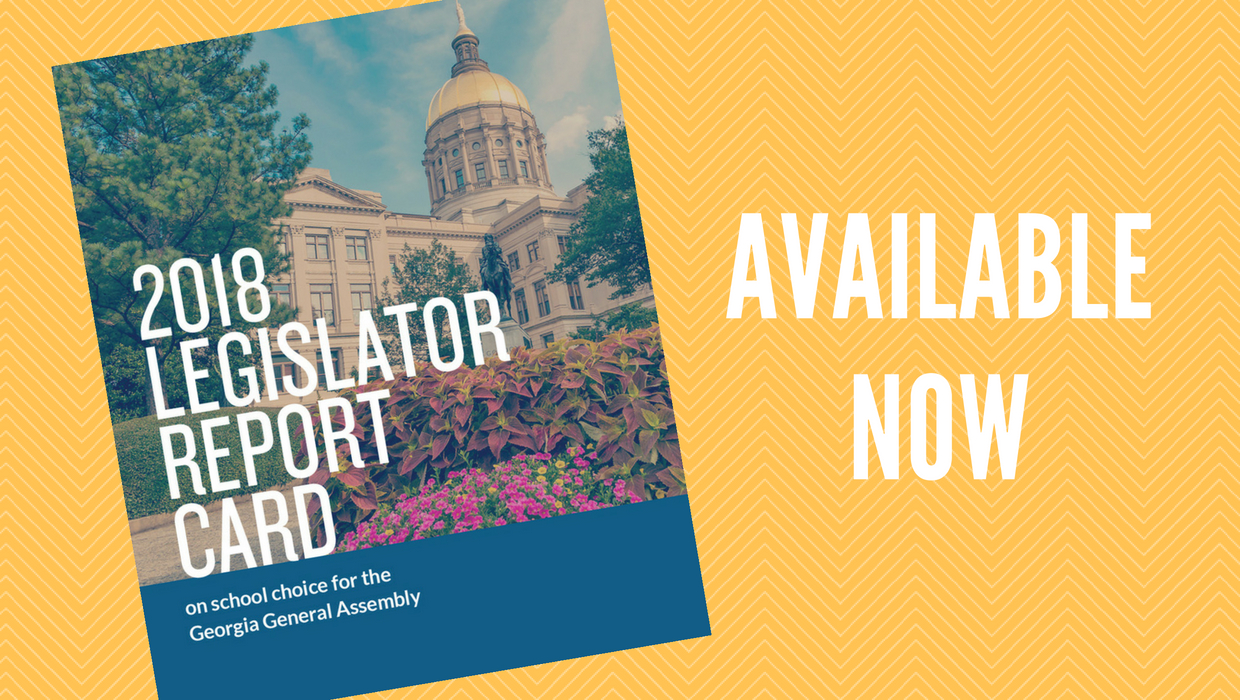
by Georgia Center for Opportunity | Oct 12, 2018
Peachtree Corners—A new poll released by the Georgia Center for Opportunity (GCO) has found that a significant majority of likely Georgia voters—to the tune of 68 percent—support school choice for families across the state.
Ahead of the 2019 legislative session, nearly seven-in-ten (67 percent) voters say it’s important for the state legislature to enact policies that expand school choice in the next legislative session, and that support extends across party, racial, and geographic lines. Of all school choice measures available in Georgia, the Tax Credit Scholarship Program garnered the most support.
Underscoring the bipartisan nature of school choice, the survey found strong support for school choice regardless of political affiliation—75 percent of Republicans, 65 percent of Independents, and 62 percent of Democrats. Support is strong across racial and geographic lines as well: 70 percent of African-American voters and 66 percent of white voters support school choice, while voters in Augusta (76 percent), Atlanta (68 percent), and Savannah (65 percent) are also supportive.
“School choice has long been, and continues to be, a winning issue,” said Randy Hicks, GCO’s president and CEO. “No matter who’s leading under the Gold Dome in 2019, Georgians recognize its importance for creating a better tomorrow for every child, but particularly those from disadvantaged backgrounds who need help the most.”
The survey was conducted by WPA Intelligence. Interviews were collected from September 19-23 among over 600 likely voters in Georgia. The margin of error was plus or minus 4 percent.
Get more details about the poll here: GCO Poll Memo

by Georgia Center for Opportunity | Sep 24, 2018
A new poll from Education Next shows a surge in support for educational choice programs nationwide. Across the board, support is up for publicly funded school-choice scholarships, tax-credit scholarships, and public charter schools.
And not only is public support for school choice on the rise, it has jumped from plurality to majority support on several key data points:
- Support for publicly funded school-choice scholarships jumped from 45% in 2017 to 54% in 2018. More parents than ever support these scholarships—61%, up from 52% in 2017.
- While 43% support school-choice scholarships for low-income students, 56% of African American and 62% of Hispanic respondents favor them.
- Hispanic families in particular see the benefits of educational choice, with support for publicly funded school-choice scholarships increasing from 49% in 2017 to 67% in 2018.
Other insights:
- Support for public charter schools increased from 39% in 2017 to 44% in 2018.
- Opposition to publicly funded school-choice scholarships has decreased 13 percentage points since 2016, from 44% to 31% today.
While these results are good news for school-choice proponents nationwide, here in Georgia we continue to be a trendsetter in educational opportunity—ranking seventh nationally thanks to a series of school-choice laws passed since 2008, including the Tax Credit Scholarship Program and the Special Needs Scholarship Program.
All told, Georgia’s school choice programs have delivered impressive results—with more than 17,000 students benefitting in the 2016-17 school year, including 13,600 children participating in the tax credit scholarship program and 4,000 receiving tuition assistance through the Special Needs Scholarship Program.
And these programs are popular across key demographics such as political affiliation, age, and race. In Georgia, 84% of Republicans, 67% of Independents, and 55% of Democrats support school choice. Among Millennials and minorities, support is even stronger—and growing—with 74% of Latinos, 72% of African Americans, and 75% of Millennials in favor.
Even though most students will continue to be educated in traditional public schools, it’s nice to see the latest Education Next poll confirm nationally what we already know here in Georgia: School-choice options empower parents to make the best educational decisions for their children and give them the best shot to live a flourishing life.

by Georgia Center for Opportunity | Sep 5, 2018
PEACHTREE CORNERS – On Tuesday, the Georgia Center for Opportunity (GCO) announced that Buzz Brockway, an outgoing state representative from Lawrenceville, has joined the group’s executive leadership team as Vice President of Public Policy.
Since being elected to the legislature in 2010, Brockway has, among other things, sponsored and co-sponsored several bills aimed at increasing economic opportunity for Georgia families, protecting victims of human trafficking, and punishing abusers. As the Vice President of Public Policy, he will coordinate policy research and reform efforts aligned with GCO’s mission to provide all Georgians with access to quality education, meaningful work, and healthy relationships.
“This is a good day for GCO because we’re adding such a great person to our team. But this is also a good day for the people of Georgia, because it ensures that one the state’s most thoughtful and capable leaders continues to invest his considerable talents in the effort to create opportunities for all Georgians,” said Randy Hicks, President and CEO of the Georgia Center for Opportunity.
###

by Georgia Center for Opportunity | Aug 29, 2018
When it comes to expanding educational choice for all students and families in Georgia, our state has a lot to celebrate this year.
During the last legislative session, lawmakers took some crucial strides to help kids trapped in failing schools or stuck in classrooms that don’t meet their needs, particularly by expanding the Tax Credit Scholarship Program. Even so, so many of our state’s most at-risk children still lack access to real educational options. They’ll have to wait yet another year to get the quality education they need to achieve their dreams and become productive members of society.
Here at Georgia Center for Opportunity, our goal is to keep you fully up-to-date on which school choice bills passed—and which didn’t—during the most recent legislative session. We’re also committed to sharing how your elected representatives voted on each of these bills.
That’s why we’re so excited to release our 2018 Georgia Legislator Scorecard on School Choice. This report card tracks how every legislator voted on school choice bills before the state assembly—and assigns a letter grade just like our students receive in school. We also offer a recap of how each bill fared in each legislative chamber—with failed or stalled bills noted, indicating our focus for the upcoming 2019 session.
Many legislators say they support school choice during the campaign season, but the true test of whether they walk their talk is revealed in how they vote on bills that empower parents with the options and resources they need to secure the best education for their children.
We hope you find this scorecard useful, and we hope you share it with your family and friends! Download the Report Card HERE.

by Georgia Center for Opportunity | Aug 29, 2018
33 state lawmakers recognized for outstanding support of school choice in 2018
PEACHTREE CORNERS – On Wednesday, the Georgia Center for Opportunity (GCO) released their 2018 Legislator Report Card, a scorecard recognizing state lawmakers according to their voting record on key school choice bills. The report empowers parents to see where their Representative and Senator stood on bills that would expand access to quality education for kids throughout the state.
Randy Hicks, President and CEO of the Georgia Center for Opportunity, said the scorecard is necessary because too many children are waiting for their chance at a better education.
“Time and again, Georgians on all sides of the aisle continue to express their support for expanding parental choice,” Hicks said. “We praise the legislators who prioritized children and families in 2018, and look forward to seeing greater movement under the Gold Dome to ensure all students have access to the best possible education.”
Legislation considered in the scorecard include an expansion to the state’s tax credit scholarship program and increases to funding of state charter schools. Both bills passed in 2018.
The scorecard ranks legislators on an A-F grade scale, though special honors were given to those who demonstrated outstanding support for educational choice. Members were named a “School Choice Champion” if they received As following both the 2017 and 2018 sessions, while those on the “Honor Roll” were recognized for sponsoring or co-sponsoring a bill that would increase educational options.
In total, 33 current and outgoing legislators in the House and Senate received “Honor Roll” and/or “School Choice Champion” honors. Some are listed twice as they were given both designations. They include:
School Choice Champion:
Senator John Albers (R- Alpharetta)
Senator Burt Jones (R- Jackson)
Senator William Ligon Jr. (R- Brunswick)
Senator Josh McKoon (R- Columbus)
Senator Fran Millar (R- Dunwoody)
Senator Michael Williams (R- Cumming)
Representative Buzz Brockway (R- Lawrenceville)
Representative Wes Cantrell (R- Woodstock)
Representative John Carson (R- Marietta)
Representative David Casas (R- Lilburn)
Representative David Clark (R- Buford)
Representative Heath Clark (R- Warner Robins)
Representative Earl Ehrhart (R- Powder Springs)
Representative Barry Fleming (R- Harlem)
Representative Mike Glanton (D- Jonesboro)
Representative Rich Golick (R- Smyrna)
Representative Scott Hilton (R- Peachtree Corners)
Representative Jan Jones (R- Milton)
Representative Todd Jones (R- South Forsyth)
Representative David Knight (R- Griffin)
Representative Randy Nix (R- LaGrange)
Representative Ed Setzler (R- Acworth)
Representative Valencia Stovall (D- Forsyth Park)
Representative Sam Teasley (R- Marietta)
Representative Scot Turner (R- Holly Springs)
Honor Roll:
Senator Brandon Beach (R- Alpharetta)
Senator Matt Brass (R- Newnan)
Senator Chuck Hufstetler (R- Rome)
Senator Fran Millar (R- Dunwoody)
Senator Ben Watson (R- Savannah)
Representative Kasey Carpenter (R- Dalton)
Representative John Carson (R- Marietta)
Representative David Casas (R- Lilburn)
Representative Heath Clark (R- Warner Robins)
Representative Robert Dickey (R- Musella)
Representative Earl Ehrhart (R- Powder Springs)
Representative Mike Glanton (D- Jonesboro)
Representative Rich Golick (R- Smyrna)
Representative Scott Hilton (R- Peachtree Corners)
Representative Rick Jasperse (R- Jasper)
Representative Jan Jones (R- Milton)
Representative Todd Jones (R- South Forsyth)
Representative Randy Nix (R- LaGrange)
Representative Jay Powell (R- Camilla)
Representative Alan Powell (R- Hartwell)
Representative Ed Setzler (R- Acworth)
Representative Valencia Stovall (D- Forest Park)
Representative Sam Teasley (R- Marietta)
Representative Scot Turner (R- Holly Springs)
The 2018 Legislator Score Card on School Choice can be downloaded online at foropportunity.org/education/school-choice.
###
Georgia Center for Opportunity (GCO) is independent, non-partisan, and solutions-focused. Our team is dedicated to creating opportunities for a quality education, fulfilling work, and a healthy family life for all Georgians. To achieve our mission, we research ways to help remove barriers to opportunity in each of these pathways, promote our solutions to policymakers and the public, and help effective and innovative social enterprises deliver results in their communities.

by Georgia Center for Opportunity | Aug 8, 2018
PEACHTREE CORNERS – On Wednesday, the Georgia Center for Opportunity (GCO) announced that Bill Rodgers, a seasoned C-level business executive with experience as a key leader of Fortune 500 companies like Johnson Controls and Waste Management, would oversee the organization’s newly created Workforce Solutions division.
The Workforce Solutions arm of GCO bolsters the organization’s efforts to help the unemployed find work. As Vice President, Rodgers will help establish new programs and resources to aid Georgia businesses in successfully hiring un- and underemployed men and women.
“It’s rare to find an organization so uniquely positioned to address an issue as critical as unemployment,” Rodgers said. “Not only does GCO understand the full extent of challenges faced by un- and underemployed men and women, but they are also well-positioned as leaders with key stakeholders and communities across the state. It’s exciting to join a team that is perfectly postured to make an impact in the lives of families and set an example that can be replicated in other states.”
President and CEO Randy Hicks said he is “thrilled” to welcome Rodgers, who brings over three decades of top-tier business strategy and community leadership to GCO.
“Georgia’s economy is growing and yet threatened with a workforce shortage. But the greatest sense of urgency stems from our concern for the many Georgians who face barriers to enter the workforce,” said Hicks. “Bill’s expertise and understanding of the needs faced by the business community will be a great asset as we fervently work to create access to success for all.”
Since 2001, Rodgers respectively served as the President and CEO of Four 12 Solutions, Goodcents Holdings, Inc., and Emcor Facilities Services, Inc. He is a graduate of Florida Southern College and currently resides in Milton.


